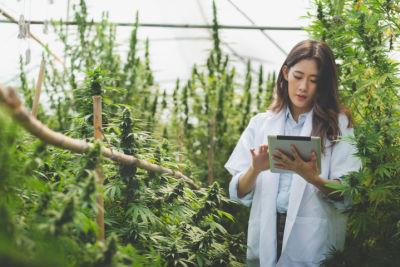
Thursday September 16, 2021
 Education
Education
In 2020, the edible market as a whole saw a 54% increase, and industry experts predict that the edibles industry is expected to be worth 11.5 billion by 2025. Globally, the edibles market makes up 11% of sales in the industry and is currently worth 1.23 billion. With numbers like that, it could be very appealing to start an edible company of your own, but it takes much more than simply obtaining a business license and setting up a shop in your hometown to get into the edible business.
Starting an Edibles Business: Step by Step
In this article, we break down what is required of someone who wants to start their journey into the edible industry. Along the way, there are likely to be many quirks and headaches unique to the area you’re looking to open your business in, and in every case the best defense is to be prepared and stay flexible.
Step 1. Think about where you want your kitchen to be, and understand the rules and regulations of potential municipalities.
It is important to note that not all municipalities are the same. Most require a $5,000 non-refundable application fee, just to start with, and that can vary widely by state. So, if you’re serious about entering this industry, doing your background research is imperative.

Your first step in this process will be looking up municipality ordinances and spending a good chunk of time at planning commissions and city hall meetings. Keep these factors in mind when selecting your kitchen location.
Step 2. Have your business plan made and all your finances in a row before applying.
Like any business, a formal business plan should be made, and in the cannabis industry, most municipalities require it before you can apply for a license. Organization is key here. The more organized you are, the more professional you will appear, which is essential when you’re trying to persuade city officials to support you. From capital requirements to permits, licensing, lawyer costs, and more —there are many expenses and fees that you will be required to pay that you may not think about. On average, the cost of opening a cannabis business starts at $250,000 and that’s before the cost to make your baked goods.
Step 3. Figure out where you’re sourcing cannabis for your products and what that entails.
Do you plan to grow your own cannabis for your goodies or are you buying product from a licensed grow or extraction facility? If you plan to use cannabis oils in your products, you’ll need to hire an extractor or find a wholesaler, or, if you do these things on your own, you will have to get a separate cultivation or extraction license, which means more regulations and more money.

The cost of sourcing materials yourself vs. buying from other retailers will be heavily impacted by the cost of starting up cultivation or extraction operations in your area, so consider that when planning.
Step 4. Start the licensing process and know cannabis kitchen regulations.
Regulations for licensing any type of cannabis business may vary, but here we’re going to focus on obtaining a processing license. There are a lot of requirements that one is expected to meet to obtain a license and the requirements vary by state. But generally, all states require what is listed below:
- All products must be manufactured in a licensed, commercial kitchen
- Applicants’ basic information
- Applicant must be over the age of 21 to apply for a facility license
- Proof of business structure (corporation, LLC, sole Proprietor, etc.)
- Building permit number
- $5,000 security deposit for license
- Proof that a licensed extractor has been employed at the facility to extract cannabis byproduct
- All employees that are a part of the manufacturing process must be ServSafe certified
- Potency of products must be in line with state law
- All items that may become incompliant with state regulations must be removed from shelves and cannot be sold
- License must be renewed annually
- Licensing fees must be paid annually (an average of $2500 per facility)
- Owner of the property, building, and employees cannot have a drug-related crime or have a federal or state crime on their record within the past 10 years.*
*Again, this can differ state by state. Some states’ equity laws allow for granting licenses to parties with past cannabis convictions.
Cannabis Packaging and Advertising Laws for Edibles
As if requirements surrounding licensing weren’t enough, get ready, there are more hoops to jump through regarding compliance around packaging and advertising. And like everything else, these rules vary from state to state.
Packaging
Here are the typical requirements for cannabis product packaging:
- Childproof packaging is required in most states
- Products cannot be packaged or named in a way where it could be confused with a trademarked candy or baked good
- Cannabis cannot be added to trademarked products to be sold by the processing facility
- Products cannot be brightly colored or be made into shapes that could appeal to children (animals, cartoon characters, etc.)
- Products must be stored in opaque packaging
Additionally, all of the following must be printed clearly on all edible packaging:
- Name of product and retail location
- “Made in Marijuhana facility” is stated
- Safety and health warning labels
- Facility license and batch number
- All ingredients and potential allergens
- Recommended use-by dates
- Nutrition facts (if available)
- Types of cannabinoids and measurements, with dosage information
- Product identification number as designated through a state-regulated tracking system
- Name and Address of Processing facility
Advertising
When making your business plan, you’ll also need to address how you’ll advertise your product. Many states have heavily restrictive advertising laws, some of which do not allow advertising whatsoever. If that is the case in your area, you’ll need to look into alternate channels to get the word out about your business. Social media and other digital outlets will be key then (including advertising with PotGuide, if that’s something your business is interested in). In states where advertising is legal, here are some of the typical regulations:
- Advertisements cannot appeal to minors
- A certain percentage of an advertising platform’s target audience must be under the age of 21. This normally ranges anywhere from 30-75 percent.
- Cannot promote excessive use
- Must present if the product poses a significant health risk to the public
- Cannot promote health claims or language that is false, misleading, or deceptive
- Advertisement must not be placed within a designated distance from a school, church, or youth center
- Cannabis businesses cannot give away free products as a form of advertisement.
Conclusion
It's clear to see that starting any kind of cannabis business is easier said than done, but it’s important to note that the edible business is particularly difficult because it is so saturated. There is a lot of competition, so you’ll need to be prepared on all fronts in order to success. But if you have the resources that are needed, have perfected your recipes, and can think of a way to make yourself truly stand out from the crowd— you should be getting a piece of that sweet, edible pie in no time.
Sources:
General
Schaneman, B. (2021, January 11). Edibles Outperform Cannabis Industry Growth in 2020 on COVID-Spurred Sales Surge. Mjbizdaily.Com. https://mjbizdaily.com/edibles-outperform-cannabis-industry-growth-in-2020-on-covid-spurred-sales-surge/
Kovaceich, N. (2019, February 1). The Hidden Costs of Cannabis. Forbes.Com. https://www.forbes.com/sites/nickkovacevich/2019/02/01/the-hidden-costs-of-the-cannabis-business/?sh=4dc5c1fb7da3
Newcomer, L. (2020, November 5). How to Start an Edible Bakery (Ultimate Step-by-Step Guide). Everythingbuttheplant.Com. https://everythingbuttheplant.com/blogs/blog/how-to-start-a-cannabis-bakery
Weisz, B., & Rosenblum, M. (2021, August). Cannabis State-by-State Regulations. Thompsoncoburn.Com. https://www.thompsoncoburn.com/docs/default-source/blog-documents/ranking-of-state-cannabis-regulations.pdf
Edible Laws and Regulations Links
California Department of Public Health. Annual License Application Checklist For Cannabis Manufacturers.Cannabis.ca.gov. https://www.cdph.ca.gov/Programs/CEH/DFDCS/MCSB/CDPH%20Document%20Library/AnnualApp_Checklist.pdf
Michigan Department of Licensing and Regulatory Affairs. August 2021 (updated). Requirements and Restrictions on Marijuana-Infused Products; Edible Marijuana Product (Rule 33). Michigan.gov. https://www.michigan.gov/mra/0,9306,7-386-83994-454561--,00.html
475B.090. — Cannabis Regulation. 2020 State of Oregon. Updated 2020 Reg. Sess. (OR. 2019) https://www.oregonlegislature.gov/bills_laws/ors/ors475B.html
Comprehensive Cannabis Consulting. 2020 Maine Recreational Business Licensing Process for Marijuana Establishments. (n.d.). 3ccannabisconsulting.Com. Retrieved July 22, 2021, from https://www.3ccannabis.com/2020/01/2020-maine-recreational-marijuana-establishment-licensing
LaVia. (2020, January 3) Maine Cannabis Regulations: License Applications, Forms, Links and Other Resources. Viridiansciences.com. https://www.viridiansciences.com/blog/maine-cannabis-regulations-license-applications-forms-links-and-other-resources
California BUSINESS AND PROFESSIONS CODE - BPC DIVISION 10. Cannabis [26000 - 26260] https://leginfo.legislature.ca.gov/faces/codes_displayText.xhtml?lawCode=BPC&division=10.&title=&part=&chapter=15.&article=.
Are you planning on starting your own edibles business? What have your experiences been?







